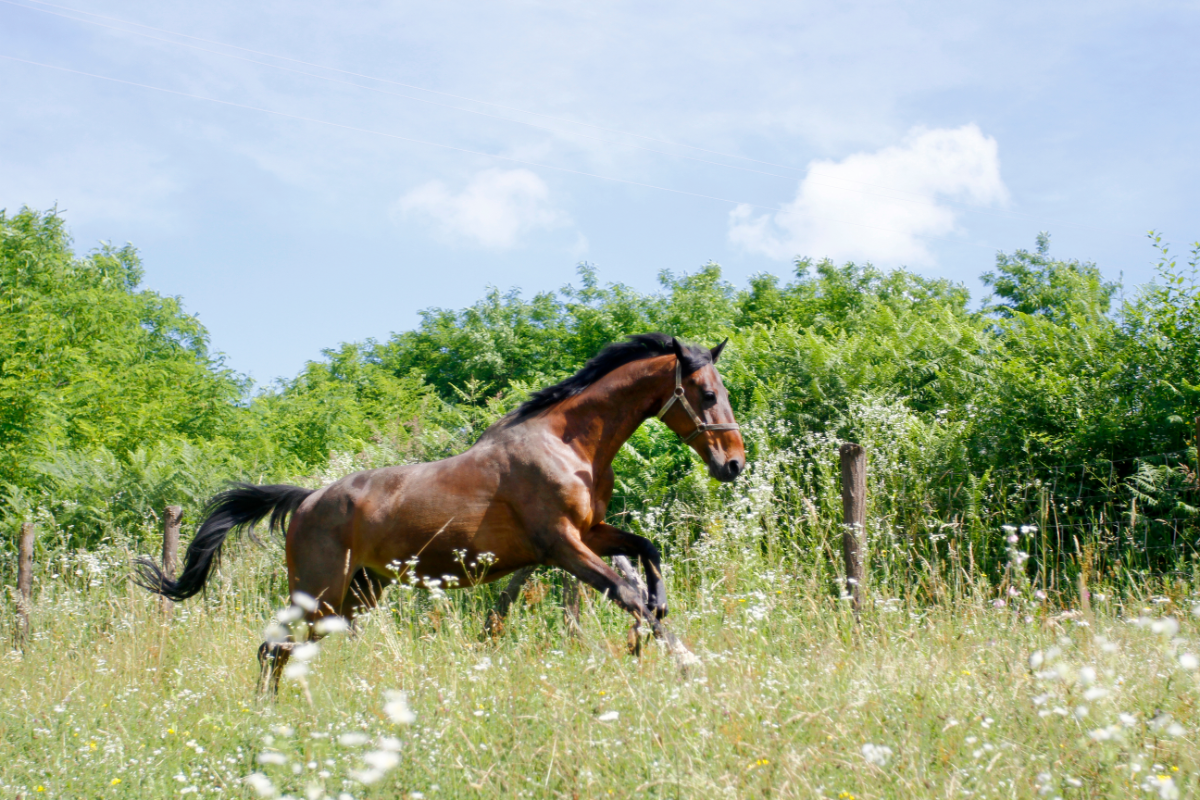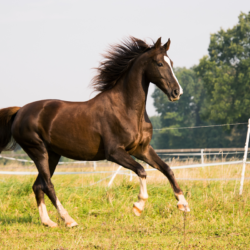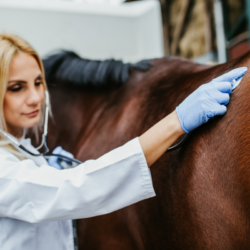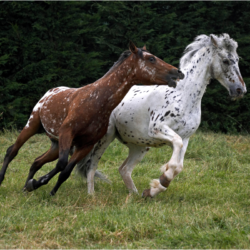Emphysema in horses, also known as chronic obstructive pulmonary disease (COPD), is a common respiratory condition that can significantly affect an animal’s quality of life. The condition is characterised by chronic inflammation of the airways, leading to airflow obstruction and breathing difficulty. The management of an emphysematous horse requires a multidisciplinary approach including environmental adjustments, drug treatments and rigorous monitoring.
Environmental management
Emphysema in horses, or chronic obstructive pulmonary disease (COPD), requires hygienic treatment to improve the animal’s quality of life. This type of non-medicinal treatment involves changing the horse’s habits to limit exposure to irritants, particularly dust.
Recommendations for owners include:
- Reduce exposure to dust: If the horse lives in a stall, taking it out to pasture every day is ideal. Avoid mulching the stall; use dust-free wood shavings as bedding and ensure that the stable is well ventilated. For work, favour outdoor areas or well-watered paddocks. Water earth or sand paddocks in summer to limit dust. If the horse lives in pasture, avoid using roundballers. Clean stalls regularly to limit ammonia emissions.
- Avoid irritants: Do not sweep the stable when the horse is in its stall; do so when the horse is in the meadow. Keep the horse away from straw and manure piles, which are sources of dust and mould.
- Maintain a clean environment: Dust the stable regularly, including the ceilings, taking the horse out first. Use wood shavings as bedding to limit dust and ammonia.
- Adapt lifestyle and work: Reduce training in winter, when symptoms are more severe. Ensure a good warm-up and regular breaks during work sessions. If the horse is severely affected, work slowly to improve muscle oxygenation.
The key to success lies in reducing exposure to dust. A horse with emphysema can see a significant reduction in its symptoms with proper management of its environment and constant attention to its well-being.
The role of feed
To improve the respiratory health of a horse with emphysema, it is essential to modify its diet. Stop feeding dry hay.
- Dust-free hay: Use a hay purifier to remove dust. If this is not possible, wet the hay by soaking it for at least 30 minutes before feeding it, or opt for wrapped hay, which is less dusty but richer.
- Quality hay: Choose quality hay that is well dried when baled. Avoid poorly prepared or preserved hay, which contains more dust and moulds, which can trigger allergic attacks.
- Distribution methods: Distribute hay on the ground rather than overhead to reduce dust inhalation. Use hay bags to minimise particle dispersion.
- Alternatives to hay: Replace hay with alfalfa (cubes), hay pellets, hydroponic hay,grass silage or fresh grass. These alternatives are less dusty and meet the horse’s nutritional requirements.
- Precautions: When using soaked hay, take care not to soak for more than 30 to 60 minutes to avoid bacterial proliferation and loss of nutrients. Steaming is another option, allowing hay to be sterilised without altering its nutritional value.
By adapting the diet and reducing exposure to dust, the management of emphysema in horses can be considerably improved, enhancing their well-being and performance.
Medicinal treatments
Medicinal treatments aim to improve the horse’s comfort by treating the various symptoms of emphysema:
- Anti-inflammatories (corticosteroids): Reduce inflammation of the lungs. Administered mainly by injection in decreasing doses, corticosteroids can cause undesirable long-term effects. Nebulisation is preferred to minimise these effects, although it is more restrictive and costly. Nebulisation makes it possible to combine corticosteroids with solutions based on plants or essential oils to improve breathing, or even to replace anti-inflammatories altogether.
- Bronchodilators: Improve airflow by treating bronchial obstruction. They are administered in syrup form, but can be expensive for long-term treatments.
- Mucolytics: Reduce mucus secretion and facilitate its excretion.
In an emergency, treatments may include powerful anti-allergics and products that increase the diameter of the bronchi, injected directly into the horse’s vein. Vets also prescribe aerosol or oral treatments. For advanced cases, they recommend corticosteroids to rapidly reduce acute inflammation, often supplemented by bronchodilators to improve respiratory efficiency.
However, these treatments are not suitable for prolonged use because of their many side effects. Corticosteroid doses should be gradually reduced. Bronchodilators should be used concomitantly with corticosteroids to avoid loss of efficacy.
To be truly effective, this medical treatment must always be accompanied by appropriate environmental measures.
Natural management
To support respiratory function and limit coughing in horses with emphysema, there are many herbal supplements available, designed to minimise the use of chemical molecules. Supplementary feeds designed for horses living in dusty or pollen-rich environments often contain suitable plants.
- Nigella (black cumin): This omega-rich oil has bronchodilator and anti-allergy properties.
- Coltsfoot: Rich in mucilage, it is an effective remedy for chronic coughs.
- Thyme: Helps the respiratory system to function properly, particularly beneficial in dusty environments.
- Marshmallow: Used to soothe the respiratory tract thanks to its high mucilage content.
- Boswellia serrata: Has soothing properties thanks to its boswellic acid.
- Licorice: Contains saponosides such as glycyrrhizin, which liquefies nasal and bronchial secretions.
Supplementation with omega-3 fatty acids is also recommended for its anti-inflammatory properties. Studies show that a daily dose of 1.5g of docosahexaenoic acid (DHA) for 2 months, combined with a low-dust environment, significantly improves clinical signs and reduces respiratory inflammation.
The use of phytotherapy and supplements such as plantain (anti-allergic) and echinacea (immunomodulating) can also be beneficial in treating emphysema. For inhalation, we recommend starting with herbal teas (thyme, eucalyptus) and then hydrolats (thyme, hyssop, eucalyptus). Essential oils of eucalyptus, peppermint, rosemary, thyme, cypress and chamomile can be used in inhalation to improve breathing, but only as a last resort. In gemmotherapy, blackcurrant and bramble are recommended for their anti-inflammatory properties and their ability to oxygenate respiratory tissues.





